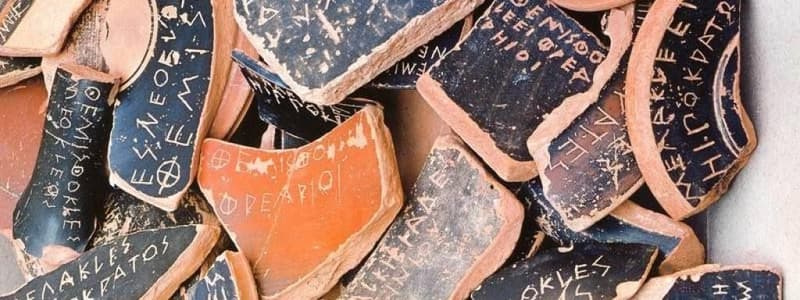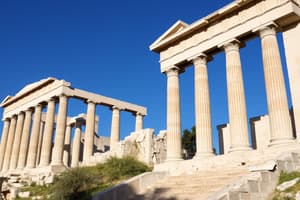Podcast
Questions and Answers
What was the primary objective of Cleisthenes' reforms in ancient Athens?
What was the primary objective of Cleisthenes' reforms in ancient Athens?
- To grant absolute power to the archons.
- To limit the powers of the assembly and promote tyranny.
- To abolish the council and empower the assembly.
- To create a mixed polity of citizens for securing the unity of the state without the need of a tyrant. (correct)
What was the role of the prytaneis in ancient Athens?
What was the role of the prytaneis in ancient Athens?
- To elect the archons.
- To oversee the assembly.
- Summoned the Ecclesia (assembly), received envoys and letters addressed to the state, and conducted other day-to-day business. (correct)
- To advise the council.
What was the primary purpose of the law of ostracism in ancient Athens?
What was the primary purpose of the law of ostracism in ancient Athens?
- To remove tyrants and their followers. (correct)
- To limit the powers of the assembly.
- To promote internal strife.
- To punish crimes against the state.
How many votes were required for an ostracism to take place in ancient Athens?
How many votes were required for an ostracism to take place in ancient Athens?
What was the duration of exile for a person ostracized in ancient Athens?
What was the duration of exile for a person ostracized in ancient Athens?
What was the role of the Boule (citizen's council) in ancient Athenian democracy?
What was the role of the Boule (citizen's council) in ancient Athenian democracy?
What was the procedure of voting used in the law of ostracism in ancient Athens?
What was the procedure of voting used in the law of ostracism in ancient Athens?
What was the consequence for a person who was ostracized in ancient Athens?
What was the consequence for a person who was ostracized in ancient Athens?
Why was ostracism introduced in ancient Athens, according to Aristotle?
Why was ostracism introduced in ancient Athens, according to Aristotle?
What was the frequency of the vote on ostracism in ancient Athens?
What was the frequency of the vote on ostracism in ancient Athens?
Flashcards are hidden until you start studying
Study Notes
Cleisthenes' Reforms
- Cleisthenes introduced changes related to the new social classes and the growth of the hoplite army, reflecting a higher standard of living.
- His reforms, known as isonomia, established equality of rights among all citizens, but not yet rule by the people.
The Athenian Citizens' Council (Boule)
- The council acted as a probuleutic and advisory body, bound by the final decisions of the ecclesia.
- It was composed of 500 members, with 50 representatives from each tribe (10 tribes), serving for one-tenth of the year.
- Each prytany (group of ‘presidents’, executives of the Boule) had a chairman (epistates) who served for 24 hours, ensuring a general and continuous turnover.
Electing the Strategi
- First time that army leaders, the strategi, were elected (10 of them).
The Law of Ostracism
- Cleisthenes introduced the law of ostracism, a measure against powerful individuals and possible tyrants.
- The procedure involved a secret ballot, with a simple majority deciding, and a quorum of 6,000 votes needed.
- Ostracism aimed to prevent internal strife and remove individuals who threatened the peace of the community.
Studying That Suits You
Use AI to generate personalized quizzes and flashcards to suit your learning preferences.




